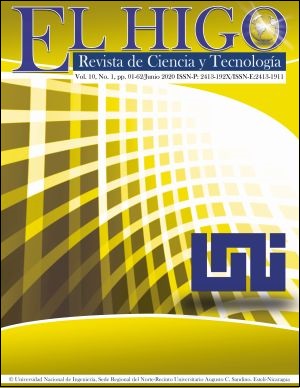Proposed methodology for the insertion of the entrepreneurial spirit in didactic planning
DOI:
https://doi.org/10.5377/elhigo.v10i1.9924Keywords:
Entrepreneurship, didactic planning, learning activitiesAbstract
In Nicaragua, valuable efforts have been made by the state, private companies and the education system to promote and develop entrepreneurship in the field of education, such is the case of the National Educational program "Learn, Undertake, prosper" which integrates the three educational subsystems. Despite these efforts, the implementation of strategies that allow the creation of an entrepreneurial educational profile in the different study houses must continue. In this sense, the need for a methodology that allows inserting entrepreneurship in the different study plans of university degrees is notorious, not necessarily creating new subjects, but designing learning strategies that allow the development and empowerment of promoting entrepreneurial culture in the students. Based on the references consulted, through this research a work methodology was proposed, which allowed the identification of learning strategies that included the empowerment of entrepreneurial characteristics, considering the thematic units and the attitudinal objectives that are carried out during the development of the academic activities, describing the logical sequence a for the pertinent design of the strategies, with the definition of the didactic resources necessary for its implementation, as well as the definition of the criteria to be considered by the teacher to check the development of the entrepreneurial spirit.
Downloads
712
References
Álvarez, P.R. (2016). Competencias genéricas en la enseñanza universitaria. De la tutoría formativa a la integración curricular. Málaga: Ediciones Aljibe.
Arasti, Z., Kiani, M. y Imanipour, N. (2012). A Study of Teaching Methods in Entrepreneurship Education for Graduate Students. Higher Education Studies, 2(1), 2-10.
Arruti, A. (2016). El desarrollo del perfil del teacherpreneur o profesor-emprendedor en el currículum del Grado de Educación Primaria: ¿un concepto de moda o una realidad? Contextos educativos, 19, 177-194.
Aquije, M. (2012). Tú eres un emprendedor: Editorial San Marcos. Lima Perú
Coloma, A. M., Jiménez, M. Á. y Sáez, A. M. (2007). Metodologías para desarrollar competencias y atender a la diversidad. Guía para el cambio metodológico y ejemplos desde infantil hasta la universidad. Madrid: PPC Editorial. Comisión Europea (2008). Entrepreneurship in Higher Education, especially in non-business studies. Comisión Europea (2016a).
Dacin, T.; Dacin, P.A. Y Tracey, P. (2011) Social entrepreneurship: a critique and future directions. Organization Science, vol. 22, nº 5, pp. 1203-1213.
De la Fuente, J., Vera, M.M. y Cardelle-Elawar, M. (2012). Aportaciones de la Psicología de la Innovación y del Emprendimiento a la Educación en la Sociedad del Conocimiento. Electronic Journal of Research in Educational Psychology, 10(3), 941-966.
De Miguel, M. (Coord.) (2005). Modalidades de Enseñanza centradas en el desarrollo de Competencias: orientaciones para promover el cambio metodológico en el Espacio Europeo de Educación Superior. Proyecto EA2005-0118.
De Miguel, M. (Coord.) (2006). Metodologías de enseñanza y aprendizaje para el desarrollo de competencias. Orientaciones para el profesorado universitario ante el Espacio Europeo de Educación Superior. Madrid: Alianza Editorial.
Fayolle, A. y Gailly, B. (2008) From craft to science. Teaching models and learning processes in entrepreneurship education. Journal of European Industrial Training, vol. 32, nº 7, pp. 569-593.
Fernández, A. (2006). Metodologías activas para la formación de competencias. Educatio siglo XXI, 24, 35-56.
Ferrer-Cerveró, V., Cabrera-Santacana, O. E., Alegre-Beneria, R. M., Montané-Lopez, A., Sánchez-Valverde-Visus, C., y Alaiz-ChuecA, E. (2014) El perfil del emprendedor social del estudiantado de los Grados de Educación Social, Pedagogía y Trabajo Social en la Universidad de Barcelona. [En línea] REIRE, Revista d’Innovació i Recerca en Educació, vol. 7, nº 1. Disponible en: http://www.ub.edu/ice/reire.html. ISSN: 2013-2255.
García, R., Traver, J.A. y Candela, I. (2001). Aprendizaje cooperativo. Fundamentos, características y técnicas. Madrid: Editorial CCS.
González, J. y Wagenaar, R. (Eds.). (2003). Tuning Educational Structures in Europe. Informe Final. Fase Uno. Deusto: Universidad de Deusto.
Jiménez, G., Elías, R. y Silva, C. (2014). Innovación docente y su aplicación al EEES: Emprendimiento, TIC y Universidad. Historia y Comunicación Social, 19, 187-196.
Jiménez, R. (Coord.). (2015). Educación emprendedora. Programa TALOS para el desarrollo de la iniciativa emprendedora en Ciencias de la Educación. Barcelona: Editorial Octaedro.
Jones, C.; Matlay, H. Y MaritZ, A. (2012) Enterprise education: for all, or just some? Education +Training, vol. 54, nº 8/9, pp. 813-824.
Korainen, m. y Ruohotie, P. (2001. In the Pursuit of Conative Constructs into Entrepreneurship Education. Journal of Entrepreneurship Education, vol. 3, pp. 9-22.
Korsgaard, S. (2011) Opportunity formation in social entrepreneurship. Journal of Enterprising Communities: People and places in the global economy, vol. 5, nº 4, pp. 265- 285.
Labrador, M. J. y Andreu, M. Á. (2008). Metodologías activas. Grupo de Innovación en metodologías activas (GIMA). Valencia: Editorial UPV.
Merino, M. and Vargas, D. (2011), “Evaluación comparativa del potencial emprendedor de Latinoamérica: una perspectiva multinivel”, Academia Revista Latinoamericana de Administración, Vol. 46 No. 46, pp. 38-54.
Miller, T.L.; Wesley II, C.L. y Williams, D.E. (2012) Educating the minds of caring hearts: comparing the views of practitioners and educators on the importance of social entrepreneurship competencies. Academy of Management Learning & Education, vol. 11, nº 3, pp. 349-370.
Moust, J., Bouhuijs, P. y Schmidt, H. (2007). El aprendizaje basado en problemas: guía del estudiante. Cuenca: Ediciones de la Universidad de Castilla-La Mancha.
.Osorio, F.F. y Pereira, F. (2011) Hacia un modelo de educación para el emprendimiento: una mirada desde la teoría social cognitiva. Cuadernos de Administración, vol. 24, nº 43, pp. 13-33.
Pache, A.C. y Chowdhury, I. (2012) Social entrepreneurs as institutionally embedded entrepreneurs: Toward a new model of social entrepreneurship education. Academy of Management Learning & Education, vol. 11, nº 3, pp. 494-510.
Pfeilstetter, R. (2011) El emprendedor. Una reflexión crítica sobre usos y significados actuales de un concepto. Gazeta de Antropología, 27 (1). Disponible en: http://hdl.handle.net/10481/15684. ISSN: 0214-7564.
Raposo, M. Y Do Paço, A. (2011) Entrepreneurship education: Relationship between education and entrepreneurial activity. Psicothema, vol. 23, nº 3, pp.453-457.
Ruskovaara, E. Y Pihkala, T. (2013) Teachers Implementing Entrepreneurship Education-Classroom Practices. Education + Training, vol. 55, nº 2, pp. 204 -216.
Sánchez, J.C. y Gutiérrez, A. (2011) Entrepreneurship research in Spain: developments and distinctiveness. Psicothema 2011, vol. 23, nº 3, pp.458-463.
Sánchez, J.C. (2013) The impact of an Entrepreneurship Education Program on entrepreneurial competencies and Intention. Journal of Small Business Management, vol. 51, nº 3, pp. 447-465.
Taatila, V.P. (2010) Learning entrepreneurship in higher education. Education + Training, vol. 52, nº 1, pp. 48-61.
Villanueva, S.D. (2013) Las competencias dentro del rol profesional: diferencias entre la Educación Superior (universitaria) y las demandas del mercado laboral. Revista Debate Universitario, [en línea] 1, (2m) pp. 44-65. Buenos Aires, CAEE-UAI. Disponible en: http://ppct.caicyt.gov.ar/index.php/debate-universitario/article/viewFile/1605/pdf. ISSN: 2314-1530.
Zabala, A. y Arnau, L. (2014). Métodos para la enseñanza de las competencias. Barcelona: Editorial Graó.
Downloads
Published
How to Cite
Issue
Section
License
Todo el material publicado en la revista se comparte bajo la Licencia Creative Commons Attribution-NonCommercial-NoDerivatives 4.0., se permite la copia y redistribución del material en cualquier medio o formato siempre y cuando se de crédito de forma explícita a la revista, el autor y la obra, se distribuya de forma gratuita y sin hacer modificaciones al contenido.







 Universidad Nacional de Ingeniería, Sede Regional UNI Norte. Entrada a La Tunoza, Antigua Hacienda el Higo. Estelí – Nicaragua.
Universidad Nacional de Ingeniería, Sede Regional UNI Norte. Entrada a La Tunoza, Antigua Hacienda el Higo. Estelí – Nicaragua. Tel. (505)86967849, (505) 84143047, (505) 89663120
Tel. (505)86967849, (505) 84143047, (505) 89663120